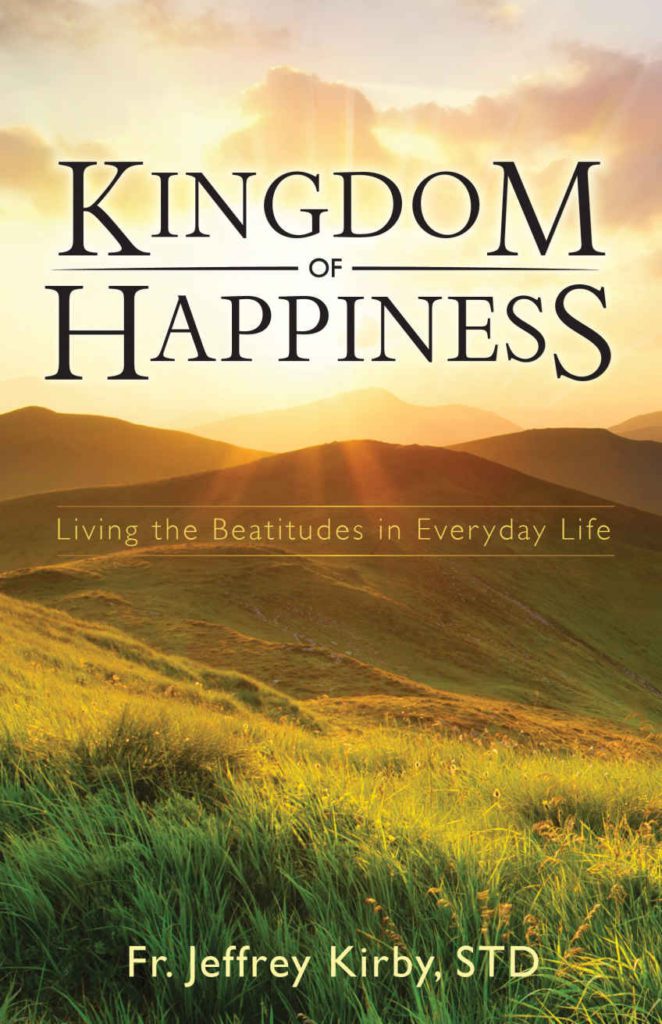 Happiness—it seems so elusive in our everyday lives, doesn’t it? This is likely not because it doesn’t exist anymore, or because we humans are a hopelessly discontent lot or even that we are too lazy to pursue it. More likely it is that we aren’t pursuing the correct definition of happiness, and therefore we miss the mark.
Happiness—it seems so elusive in our everyday lives, doesn’t it? This is likely not because it doesn’t exist anymore, or because we humans are a hopelessly discontent lot or even that we are too lazy to pursue it. More likely it is that we aren’t pursuing the correct definition of happiness, and therefore we miss the mark.
This is the premise of Father Jeffrey Kirby’s book, Kingdom of Happiness—Living the Beatitudes in Everyday Life (Saint Benedict Press, 2018). Father Kirby asserts (rightly) that Jesus is and has the path to authentic happiness, and that Jesus did us the favor of laying out that path when he gave his Sermon on the Mount and presented the Eight Beatitudes.
The word beatitude means “blessed”; this is a foundational understanding that starts us down the path. Happiness then, Biblically speaking, is defined in the book as “receiving, accepting and seeking to live in a state of beatitude, a condition of being blessed.” “Happiness,” Fr. Kirby contends, “is the satisfaction that comes from beatitude and the awareness of this blessing, and its providence, power and purpose in our lives.”
Through personal stories, practical examples, Scripture-based study and reflection questions, Father Kirby reaches out and leads us through a methodical uncovering of the providence, power and purpose we are meant to experience. He dissects the beatitudes with careful attention and a tone of encouragement, drawing out the meaning of Jesus’ teaching and convincing the reader that she can leave behind despair and reach a more meaningful existence with the Beatitudes as a compass.
There is an abundance of spiritual gold in this book. In Chapter 1, Blessed are The Poor in Spirit, my yellow highlighter was especially busy. Fresh insights such as “In our lives and in our own choices, we have to approach the kingdom of happiness with a poverty of spirit,” and “Being poor in spirit means we choose not to command things of God, our world, our loved ones, or of ourselves. We truly surrender and seek to be open to receive all things as a gift from our heavenly Father and to generously give ourselves in service to our neighbors,” are now etched in my brain. Before reading this book, actually seeking to be poor in spirit was not on my radar as a consideration.
I had never studied the beatitudes from this perspective and I found it eye-opening, inspirational and flat-out fascinating. And as an added treat to my left brain, Father Kirby weaves a connection between the Beatitudes and the Gifts of the Holy Spirit, the virtues of the Christian tradition, the petitions contained in the Lord’s Prayer, and the deadly sins. These foundations of the spiritual life are all related, Father Kirby proposes, and he proves it by plotting them on a matrix. It may be a stretch for some to connect these dots, but I found it intriguing. He also includes prayers and provides “helpful truths” at the end of each chapter, making this book conducive to a study or discussion group. I am grateful that Father Kirby’s work, though thoroughly grounded in Church doctrine and Scripture, was not an above-my-head read. It compelled me to pause and ponder frequently, but it didn’t frustrate me or bog me down with a heavy academic hand.
Viewed through solely secular glasses, the work involved in obtaining happiness using this book’s formula would be overwhelming. It’s admittedly quite counter-cultural, as it requires submission and surrender to our Lord in order to be successful. But as Catholic Christians, we understand that this surrender leads to freedom and God can and will provide us with all the graces we need to walk this path.
True happiness is attainable. The Kingdom of Happiness invites us to make that choice.
